- Home
- Johnny D. Boggs
Mojave Page 23
Mojave Read online
Page 23
Which meant that Whip Watson was going to force twenty-five of them—the twins from Savannah sharing a room—into prostitution at The Palace of Calico. The others, the more homely ones, I figured, would be auctioned off as brides.
“That is not the contract I signed,” she said.
“Invisible ink,” I said.
“And Watson likely has a copy of that contract,” Lucky Ben Wong.
“It wouldn’t hold up in court,” I said, having some experience in courts and trials and things of that nature.
“There is no court in Calico. No law. Not even a jail.” Lucky Ben Wong had to remind me of all the bad things about this burg.
“But I made a copy of the contract,” Jingfei said. “I had my attorney look at it. It’s in his office in Trinidad.”
“You went to an attorney?” Lucky Ben Wong turned pale.
“Of course,” she said. “I am no fool, Future Husband.”
“But this . . . is America . . . it is . . . the West . . . A man’s word is his bond.”
“I am no man.” She might have had to remind Lucky Ben Wong of that, but not me.
I got smart. “So, all we got to do is get a copy of the contract you signed. Show it to a circuit judge. Then when they see the contracts with the invisible ink, Whip Watson will go to prison for a good long time. That’s your plan?”
Lucky Ben Wong spoke up. “It will take weeks to get that contract to Calico.”
“Then we must fight,” Jingfei said. “Tomorrow.”
Now, I wasn’t keen on that fighting idea, not with the odds we faced, but Jingfei . . . well, all she had to do was look at me, and so I dealt myself in the game. That’s when Lucky Ben Wong rose, bowed toward his beloved, and turned to me. “Your rifle, Micah Bishop. I have cartridges.”
I stood, give him a real formal nod, and tossed him the Winchester. He caught it like he was used to catching rifles, and bowed at Jingfei one more time. My mouth dry from the thought of what might happen come daylight, I taken the teacup in my right hand. While I was sipping tea, Lucky Ben Wong tossed the rifle behind him, and his right hand come up with that “Swamp Angel” in his fist.
The little pistol was aimed right at my belly.
“Future Husband!” Jingfei jumped to her feet. “What are you doing?”
But I knowed. I’m slow, but every now and then I get struck with genius.
“It’s you. You stake everybody,” I said. “Including Rogers Canfield.”
He smiled. “And Whip Watson.”
“Candy Crutchfield, too.”
The arrogant little peckerwood grinned even wider, and I felt sick. Hurt even. Hell, I’d told Jingfei that her Future Husband was a good man. Turns out, he was a real peckerwood.
Jingfei took a step toward him, but I reached over with my free hand, and grabbed her shoulder, reined her in. No, I did not use her body to shield my own. I eased her to my side, but she was still mad, so angry she begun shaking.
“Future Husband,” she said, “I agreed to be your wife. Not a . . .” I reckon she used the Manchu word for soiled dove.
“You will be my wife,” he said. “All of the women who will work in The Palace of Calico will be married. To me. To Whip Watson’s men. And you know, as brides, you must do as your husbands command.”
That caused me to snort. He didn’t know the women I’d knowed. Especially Jingfei.
“You’re mad,” Jingfei told him.
“But this is America, Quiet Not,” Lucky Ben Wong said. “Ask him. Ask Micah Bishop. Ask him if not many gamblers have concubines who also sell their bodies to strangers. It is America. Capitalism. The Gilded Age. It does not mean that the husbands do not love their wives less. It is all for . . . money.”
She was going after the cad, and once again I had to pull her back.
“I won’t be a prostitute,” she said. That was in English, and Lucky Ben Wong cringed, but he didn’t lower the .41.
“Tell her what I say is true!” He raised the gun at my head.
Of course, what he said was true. Not that I’d ever had no concubine, or any “wife” who worked the tenderloin, but, sure, there were men who done such things. Women, too. But I told Lucky Ben Wong, “Only a son of a bitch would do such a thing.”
He sighed. Shook his head. Give Jingfei one of those loving looks. “You are a beautiful woman. The Americans would find you exotic. The Chinese would—”
“I don’t want to hear it.”
I’d heard enough. Jingfei yelled at him in rapid Chinese, and when Lucky Ben Wong dropped his head at the insults, that was all I needed. Since my left hand gripped Jingfei’s shoulder, I jerked her back, and she fell—right through the tarp. Still holding the China teacup, I flung it at Lucky Ben Wong, who flinched, the craven coward, and rushed his shot. I was also moving, through the partition, and into the dark bathhouse.
A bullet punched through the tarp. Banged off one of the coal oil cans.
“Micah!” Jingfei called out.
I reached toward her voice. Grabbed her hand. Another bullet sliced lower, banged off the tub. By then we was up and running right toward the new wall that had replaced the one I’d torn through during my last visit to Lucky Ben Wong’s.
Hit hard, smelled the kerosene, and the cans give, and dirt was falling and we went through, bouncing off the ground in the moonlit night. Behind us, still in his home, Lucky Ben Wong cussed, screamed, and shot.
Rolling over, I saw light from the hole in the wall. Lucky Ben Wong had grabbed a lantern, was holding it in his left hand. There was a flash, and a bullet zipped past my ear. Jingfei screamed—not out of fright, but anger—she was cussing her Future Husband in English and Chinese. All around us, dogs barked, hens squawked, roosters crowed, and Chinese men, women, and kids yelled.
I could make out Lucky Ben Wong, behind the dirt pouring from the roof, and the cans scattered around him. I had no gun. All I could find to defend my person—and Jingfei’s life—was an empty can of coal oil. So I grabbed it and flung it, and it sailed like one of them baseballs hurled by a ballist, and struck Lucky Ben Wong somewhere on his person.
Don’t exactly know where, and I’m still not certain what happened next. Well, I do know. Because once the Calico Print got things in order and could publish newspapers again, it had this little notice, which I clip and paste inside this journal.
DEADLY FIRE
Hurls Chinaman into Fiery Hell
In Blaze in East Calico
Lucky Ben Wong, the renowned Oriental who ran a bathhouse and barbershop in East Calico, was killed in a tragic fire that destroyed his place of business during the early morning hours of the 24th inst.
This conflagration, of course, was much smaller than the one everyone is talking about, but it does deserve notice in our newspaper.
The Celestial businessman lived where he worked, and manufactured his place with empty cans of kerosene. Having recently repaired his walls with new cans, he was apparently emptying a can to repair his abode when tragedy struck. The fuel was ignited by a lamp that stood near his body. An explosion followed, as kerosene is as explosive as gunpowder, and the burning oil consumed his body in a most shocking manner.
Perhaps the Celestial had smoked some of the opium, which was also available at his bathhouse. That might explain this act of folly, which resulted in tragedy and an agonizing death.
The entire establishment was destroyed, but the Chinese neighbors prevented the conflagration from spreading. Jasper Wiggins, barber in Calico, however, said he will be open for business in two weeks and welcomes all of Lucky Ben Wong’s former customers. Wiggins, however, wants to make it clear that his barbershop will not have opium.
That ain’t exactly how it happened, but I have yet to write a letter to the editor of the Calico Print to correct his report.
We shielded our eyes, Jingfei and me, and heard some more explosions—apparently the remaining rounds in the little hideaway gun Lucky Ben Wong was holding went off from the heat. People star
ted gathering around, a few pointing, some looking like it was a Fourth of July fireworks show, and quite a few battling the blaze with wet blankets.
“Oh,” Jingfei said. “My.”
I figured it was time to get away from there. So I helped Jingfei up and led her toward the steps in the rocks and the ladder.
We didn’t say nothing for a while. I mean, it had to be a shock. First she learns that the man she was betrothed to was a heel. Then she watches him burn like bacon. She’d come all this way, from Trinidad, Colorado, and now there was a fire consuming what was to be her home—not a loss, I can assure you—but she was a strong woman with a strong mind and strong will.
There wasn’t time for mourning, and, well, criminy, it ain’t like Lucky Ben Wong had courted her or nothing. They’d exchanged a few letters is all. Hell, she hadn’t even laid eyes on the dog till an hour earlier. A son of a bitch like that ain’t worth tears or grief.
When we reached the ladder, I asked, “Are you all right?”
“Yes.”
A sigh escaped her throat, and she leaned on me. “I was a fool.”
“No.” I lifted her chin, looked into her face. “He was the fool.”
She pulled away from me, and I figured she’d let me have it for being disrespectful about the dead, especially since the dead had been her betrothed.
“If Whip Watson learns that his silent partner is dead . . .” she began.
I finished for her. “He’ll figure it means more money for him. He ain’t gonna fret over Lucky Ben Wong’s demise. And you shouldn’t, either.”
“I won’t. But this means you have only yourself and Mister Clark. And perhaps Doctor Kent.”
“You don’t have to go back to that camp,” I told her, but I knowed what she’d say, and she said it.
“I must.”
I said, because I’d read a few of those half-dime novels writ by that Colonel Wilson J. M. Drury, even though in his stories it’s always the woman saying this to the hero: “I know.”
“I have a plan,” she said.
Then the sky behind us lit up. Another can had exploded. I could hear Chinese men directing the wet-blanket brigade.
“They’ll be able to see this fire from the canyon,” she said. “I need to get back now.”
“Be careful.” Which is what the girl always tells the hero in Colonel Drury’s dreadfuls, too.
She started toward the ladder, but turned, come to me, and kissed me. On the lips. It was a hard kiss, because she had thin lips, and they was all dried and she sort of smelled like coal oil and dirt, but it was a fine kiss. I kissed her back. Then she was starting down the ladder when another can boomed.
“What happened?” she asked.
I shrugged. “Reckon he should have washed out them cans first before using them for walls.”
“What a stupid peckerwood,” she said. “And I almost married that idiot.”
CHAPTER TWENTY-SIX
I held the ladder steady, and she hurried down into the canyon, then hitched up her skirt and took off running, but it didn’t take long till the darkness swallowed her. Unable to move, I just stood there, smelling smoke, feeling the wind at my back, staring at the darkness, wondering if I’d ever see Jingfei again.
For a moment, I cussed myself, telling me that I never should have let her go, but that spell didn’t last long. Hell, I had to admit, I couldn’t have stopped her. And, well, there was other lives at stake.
People were gathering across the bridge in Calico proper, pointing at the blaze, so I decided it would be a good idea for me to skedaddle. Down the ladder I went—with only the moonlight and the glow from that ever-growing fire over at the late Lucky Ben Wong’s place to see by, and no one holding the ladder steady for me—and found Yago sleeping where I’d hobbled him.
“All right,” I told that horse after I’d woke him by removing the hobbles, and tightening the cinch. “It’ll be a busy day this morning, boy. But that’s all right.” I taken the reins, and swung into the saddle. “Jingfei has a plan.” We rode back toward the Calico cemetery. “The problem is,” I told the Arabian, “she didn’t tell me what that plan is.”
But that was all right, too. Because I was coming up with one myself.
The sign above the door read:
S L A T E R & Mc COY
Purveyors in Implements & Sundries
The fellow underneath the sign held one such implement in his right hand, another .41-caliber “Swamp Angel,” which I guess is where the late Lucky Ben Wong had procured his.
“We’re closed,” Mr. McCoy said. He wore brown pants, brown boots, and a brown vest. The shirt was white. No tie. No hat.
I didn’t move.
“We open at eight,” he said. “Now stop banging on this door and come back then. We’re doing our books.”
“I ain’t here to buy nothing,” I said.
Which made him take a step back inside. “You must be.”
That’s when Mr. Slater, also dressed in brown, come to the door and peered over his partner’s shoulder. “Maybe he always dresses like that,” Mr. Slater said.
All right. I didn’t have nothing on but that Chinese robe, which didn’t fit too good, and certainly didn’t come close to feeling comfortable in a saddle. No boots. No socks. Not even a hat. The little Chinese girl had never returned with my duds, and knowing now that Lucky Ben Wong had planned on murdering me, I don’t think she was really a laundress or ever planned on washing those clothes.
“I’m here,” I said, “because of the vigilance committee.”
The two businessmen looked at each other. One of them said, “There’s gonna be need of some vigilancing today. Real soon.”
Mr. Slater stepped around Mr. McCoy, who lowered the little pistol. “I’ve seen you before,” Mr. Slater said.
“Yes, sir,” I told him. “I was—”
“With Whip Watson,” he interjected.
I nodded.
The two merchants give each other a glance, then Mr. Slater was nodding at his pard, and the .41 disappeared into the brown pockets, and Mr. McCoy motioned me inside.
I followed them two dudes past shovels, pickaxes, post-hole augers, folding sights, levels and transits, compasses, measuring chains, pans, buckets, canteens, barrels, and a rack of Beadle and Adams five-penny dreadfuls, and to the counter where I saw some duck trousers and shirts behind the glass panels. Mr. Slater walked into an office, and Mr. McCoy held open the door for me. Mr. Slater sat behind a desk, and Mr. McCoy stood at the door. Mr. Slater offered me a chair, but I didn’t feel right sitting down in nothing but a bathrobe, so Mr. McCoy taken the chair instead.
“What’s this about?” Mr. Slater asked. “You sure you don’t want to buy some pants?”
“Business first,” I said. And I told them. Everything.
I talked. They didn’t even interrupt.
When I’d finished, Mr. Slater pulled a cigar from a box on the top of his desk, bit off the end, and fired it up. I guess he felt sorry for me, so he slid the box, and I got myself a Jersey cheroot. He slid the box of Lucifers to me, and soon I had my own cigar smoking. To my left, Mr. McCoy coughed in his chair.
“So Whip Watson is bringing twenty-four whores to town, eh?” Mr. Slater blowed a perfect ring toward the tin ceiling. I’d never been able to blow rings myself.
“Twenty-five,” I said. “The two twins.”
“Yes,” Mr. McCoy said dreamily.
“But they ain’t whores,” I had to remind them. “They’re being forced into this business.”
“Yes,” Mr. Slater said. Then, in a tone I didn’t much care for, “So you say.”
I removed my cigar, didn’t try to blow no ring, and leaned forward, pointing my cheroot at a framed photograph of a handsome woman holding a baby girl. “You’re married, ain’t you?”
He smiled at the photograph. “Indeed I am. Twenty-three wonderful years.”
“Fourteen myself,” Mr. McCoy said. “My second wife. My first one died. Typhoid
.”
“Sorry to hear that. Well, the way I figure it, we can post vigilantes on the roofs. Let Watson parade his girls right down Main Street, right to The Palace of Calico. Then when the last of the girls is inside, y’all cut loose. Shoot them dirty dogs down like the dirty dogs they are.”
“Twenty-four ladies of the night.” Mr. Slater whistled.
“Twenty-five,” Mr. McCoy corrected. “Here. In Calico.”
“No more Betty,” Mr. Slater said.
I stood real straight, all indignant. “You want prostitutes in town?” My voice, however, sounded weak.
“Those twins,” Mr. McCoy asked. “You say they’re Southern and Irish? And they’ll be in one room?”
“They ain’t prostitutes,” I snapped. “They’re good women. Come here thinking they were mail-order brides.”
“Mail-order whores.” Mr. Slater sniggered.
“I wonder if the post office is aware of this.” Mr. McCoy giggled.
“I don’t think, Jeddah, that the Pendleton Civil Service Reform Act covered this subject at all.” Mr. Slater and Mr. McCoy had a raucous belly-laugh that got Mr. Slater coughing from his cigar, and Mr. McCoy was wheezing so bad, he laid the pocket pistol on the top of the desk, had to fetch a handkerchief from his vest pocket, and dabbed his eyes.
When the laughter died down, Mr. McCoy was about to make another comment, but I said first, “Y’all won’t do nothing to help those poor girls.”
“At Calico prices,” Mr. Slater said, “they won’t be poor for long.”
“They’ll be richer than Lucky Ben Wong is,” Mr. Slater said.
“Was,” I corrected.
They wasn’t laughing now. They was staring hard at me. I give them a grammar lesson that would make Kermit of the Calico Water Works . . . Incorporated real proud. “Is is present tense. Was is past tense. Lucky Ben Wong is dead.”
They blinked.
“Y’all didn’t see that fire last night, early this morning rather, in East Calico?”
Their heads shook.

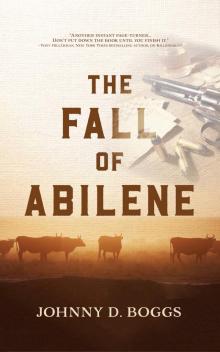 The Fall of Abilene
The Fall of Abilene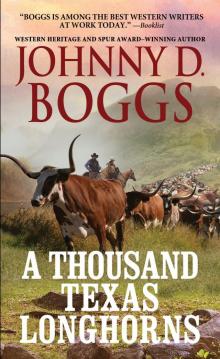 A Thousand Texas Longhorns
A Thousand Texas Longhorns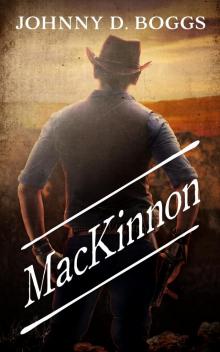 MacKinnon
MacKinnon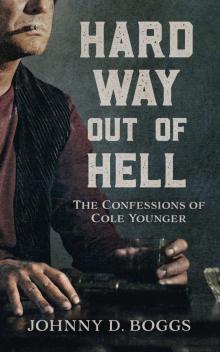 Hard Way Out of Hell
Hard Way Out of Hell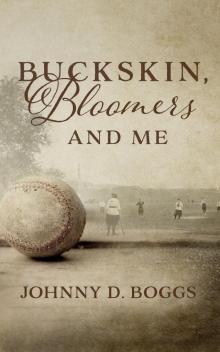 Buckskin, Bloomers, and Me
Buckskin, Bloomers, and Me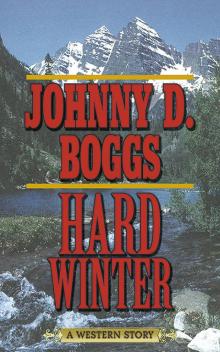 Hard Winter
Hard Winter Wreaths of Glory
Wreaths of Glory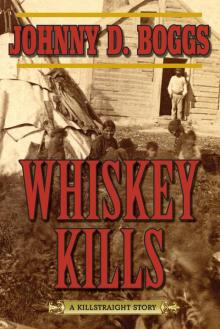 Whiskey Kills
Whiskey Kills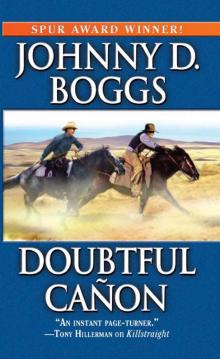 Doubtful Canon
Doubtful Canon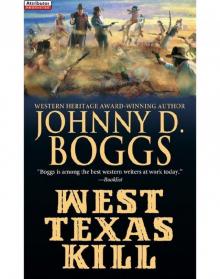 West Texas Kill
West Texas Kill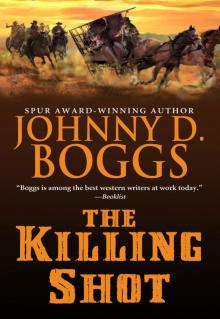 The Killing Shot
The Killing Shot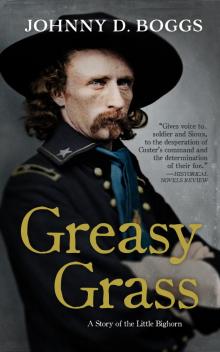 Greasy Grass
Greasy Grass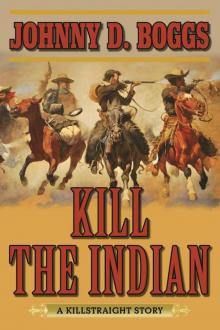 Kill the Indian
Kill the Indian Return to Red River
Return to Red River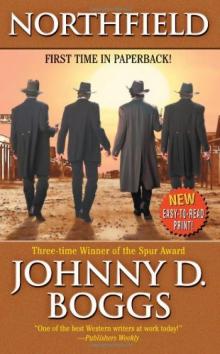 Northfield
Northfield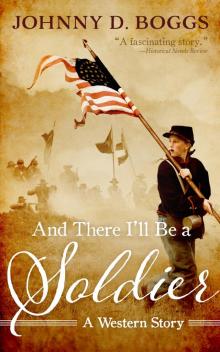 And There I’ll Be a Soldier
And There I’ll Be a Soldier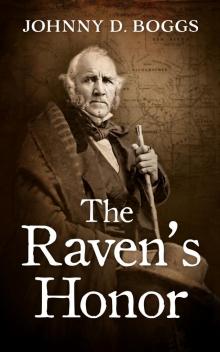 The Raven's Honor
The Raven's Honor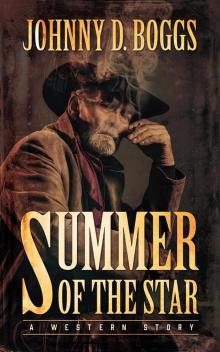 Summer of the Star
Summer of the Star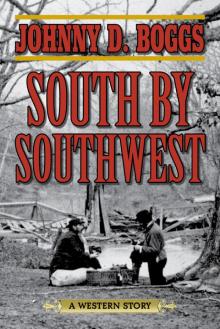 South by Southwest
South by Southwest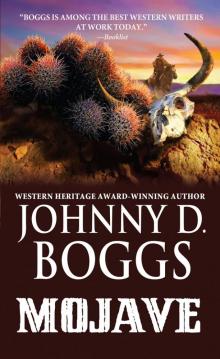 Mojave
Mojave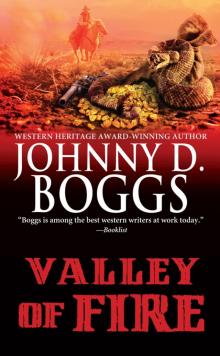 Valley of Fire
Valley of Fire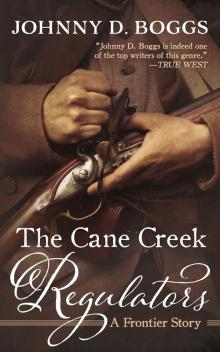 The Cane Creek Regulators
The Cane Creek Regulators